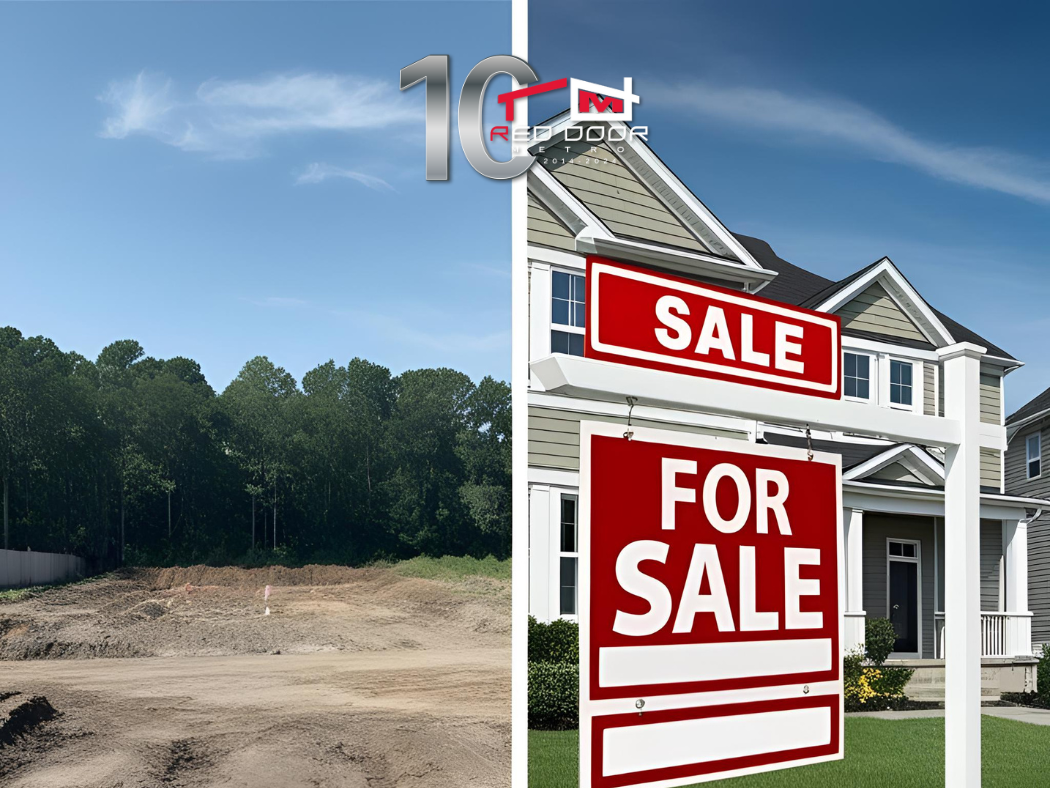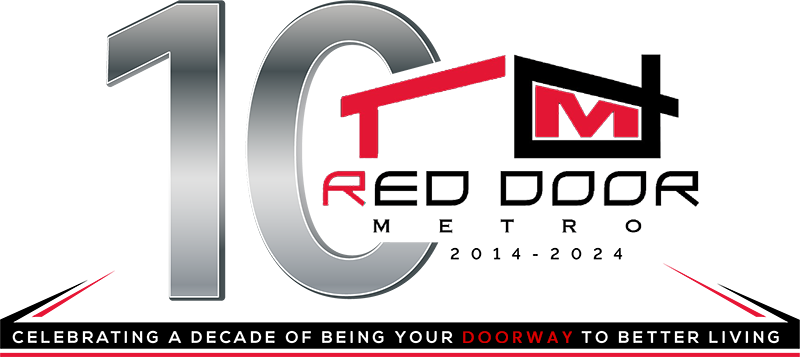The decision to build a new home or buy an existing one in Virginia is one of the most important—and financially significant—choices you’ll make as a homeowner. While both options have unique benefits, your final decision should be guided by costs, personal priorities, regional market trends, and convenience.

In this guide, we’ll explore:
-
✅ How much it costs to build vs. buy
-
✅ Regional differences across Virginia
-
✅ Pros and cons of each option
-
✅ Hidden costs to consider
-
✅ Real-world scenarios
-
✅ And ultimately, which choice might be better for you
Cost Breakdown: Building vs. Buying in Virginia
Building a House
Average Cost per Square Foot:
In Virginia, building a home generally ranges between $120 and $200 per square foot. So, a 2,500 sq ft home might cost anywhere from $300,000 to $500,000, depending on materials, finishes, and location.
Land Acquisition:
Land costs vary widely.
-
Rural areas: $30,000 – $100,000
-
Urban/suburban areas (e.g., Northern Virginia): $150,000 – $250,000+
Construction Expenses Include:
-
Permits & Inspections: $5,000 – $20,000
-
Architect & Design Fees: $15,000 – $50,000
-
Utility Connections (Water, Sewer, Electric): $10,000 – $30,000
-
Land Preparation (clearing, grading): Varies based on terrain
Unexpected Costs:
Sloping land, delays, or material price hikes can add 10%–20% to your overall budget.
Buying an Existing Home
Median Home Price (2023):
Statewide: $375,000
But this varies significantly:
-
Northern Virginia: $600,000+ (e.g., Arlington, Fairfax)
-
Central VA: $350,000 – $500,000
-
Southwest VA: $200,000 – $250,000
Additional Buying Costs:
-
Closing Costs: 2%–5% of the home price
-
Inspections & Appraisals: $300 – $600
-
Immediate Repairs or Upgrades: $10,000 – $30,000 (e.g., HVAC, roof, kitchen)
🟩 Verdict:
Building can be cheaper in rural areas where land is affordable. But in high-demand urban areas, buying an existing home typically saves more money and time.
Regional Variations in Virginia
Northern Virginia
-
High demand, limited land
-
Land prices and labor rates are at a premium
-
Buying is often more cost-effective and faster
Central Virginia (Richmond, Charlottesville)
-
Balanced market
-
Building and buying prices are relatively close
-
Offers flexibility for both paths
Rural Virginia (Shenandoah Valley, Southwest)
-
Abundant land at lower prices
-
Fewer contractors but cheaper building costs
-
Ideal for custom home builds
Pros and Cons of Building vs. Buying
✅ Building a New Home – Pros
-
Full customization – You choose the layout, features, and finishes
-
Modern efficiency – Energy-saving systems lower long-term costs
-
Lower maintenance – Everything is brand new
❌ Building – Cons
-
Long timelines (9–18 months)
-
Potential for unexpected costs and delays
-
Scarcity of contractors in rural zones
✅ Buying a Home – Pros
-
Move-in ready – No construction delays
-
Established neighborhoods – Mature trees, amenities, community
-
Potential for negotiation – Especially in slower markets
❌ Buying – Cons
-
Less design flexibility
-
Older systems may require repairs
-
Bidding wars in competitive areas
Hidden Costs to Watch For
When Building:
-
Temporary housing/rental costs during construction
-
Driveway & landscaping: $10,000 – $30,000
-
Higher taxes after the home is reassessed post-construction
When Buying:
-
Permit fees for renovations or additions
-
Historic home restrictions in cities like Williamsburg or Alexandria
-
Lead paint or asbestos in older homes may need remediation
Construction Loans vs. Traditional Mortgages
| Feature | Construction Loan | Traditional Mortgage |
|---|---|---|
| Term | Short-term (6–12 months) | Long-term (15–30 years) |
| Interest Rate | Higher (5–7%) | Lower (6–7%) |
| Down Payment | 20%–25% | 3%–20% |
| Risk | Higher (due to delays) | Lower |
Virginia Housing Trends That Affect Your Decision
-
Material Costs: Stabilized after 2022 spikes, but still higher than pre-pandemic
-
Labor Shortages: Driving up contractor wages 5–10% annually
-
Low Inventory: Especially in cities like Arlington, leading to bidding wars
-
Remote Work: More buyers are heading to rural areas like Loudoun County, increasing demand for custom builds
Time and Convenience Considerations
-
Building a home means waiting 9–18 months and dealing with permits, zoning, and weather delays.
-
Buying a home allows you to move in quickly but may require compromise on design, layout, or repairs.
Tax Implications in Virginia
Building:
-
May qualify for federal energy tax credits (e.g., solar, geothermal)
-
Property tax increases after construction is completed
Buying:
-
Lower initial tax assessments
-
Major upgrades may trigger reassessment and higher taxes
Real-World Scenarios: Build vs. Buy in Virginia
Scenario 1: Lynchburg (Central Virginia)
-
Build: 2,000 sq ft custom home for $280,000 (including $50,000 land)
-
Buy: Similar home for $260,000 but needs $40,000 in updates
-
✅ Net Cost: Roughly the same—but the new home is move-in ready with no repairs
Scenario 2: Fairfax County (Northern Virginia)
-
Build: $400,000 construction + $200,000 land = $600,000+
-
Buy: Existing home for $600,000 in a good neighborhood
-
✅ Verdict: Buying is cheaper and faster here due to high land prices and labor shortages
Conclusion: Should You Build or Buy in Virginia?
The answer depends on where you want to live, how much customization you need, and how quickly you want to move in.
Build if:
-
You’re in a rural or semi-rural area with affordable land
-
You want full control over your home’s design and energy efficiency
-
You have time to manage or oversee the building process
Buy if:
-
You’re targeting urban areas with high demand and limited land
-
You need to move quickly
-
You’re open to renovating or upgrading an existing property
Final Thought:
Whether you choose to build your dream home from scratch or buy a cozy, ready-to-move-in property, understanding Virginia’s real estate and construction landscape helps you make the most informed—and financially sound—decision.
FAQs
1. Is it cheaper to build or buy a house in Virginia?
Answer: Generally, buying a pre-existing home is cheaper upfront. However, building a home offers long-term savings on repairs, customization, and energy efficiency. It depends on your priorities and the location in Virginia.
2. What is the average cost to build a house in Virginia?
Answer: As of 2025, the average cost to build a home in Virginia is between $150 to $250 per square foot, depending on location, materials, and custom features. A 2,000 sq ft home could cost $300,000–$500,000+.
3. What is the average cost to buy a house in Virginia?
Answer: As of recent market data, the median home price in Virginia is approximately $385,000, though prices can vary widely based on the city or county.
4. What factors make building more expensive than buying?
Answer: Building involves land costs, permits, construction materials, labor, utility hookups, and often delays. These hidden costs can add up quickly and make building more expensive initially.
5. Are there areas in Virginia where building is cheaper than buying?
Answer: Yes, in rural or less developed areas, land is more affordable, and construction costs may be lower, making building more economical than buying an existing home in those regions.
6. Is land expensive in Virginia?
Answer: It varies by location. Urban and suburban areas like Northern Virginia or Richmond tend to have high land prices, while rural areas are much more affordable.
7. Can I save money by buying land and building later?
Answer: Yes, if you lock in land at a lower price, it may appreciate in value. But consider costs for maintenance, taxes, and permits if you delay construction.
8. Is building a home more customizable than buying?
Answer: Absolutely. Building allows full control over layout, materials, design, and features—unlike buying, which may involve compromising or renovating.
9. Which is faster: building or buying?
Answer: Buying is almost always faster. Building can take 6 to 12 months or more, depending on permits, weather, and contractor schedules.
10. Do new homes in Virginia offer better energy efficiency?
Answer: Yes. New builds must comply with modern building codes, often including energy-efficient windows, insulation, HVAC, and smart home technology, which saves money long-term.
11. Can I get a mortgage to build a home in Virginia?
Answer: Yes. You can apply for a construction loan, which converts into a mortgage once the home is complete. Requirements are stricter than a traditional mortgage.
12. Do builders offer financing options in Virginia?
Answer: Many builders partner with lenders or offer in-house financing for construction projects. Some may even include closing cost assistance.
13. Are property taxes higher for new construction?
Answer: Not necessarily, but your property value will be reassessed after construction, which can increase your tax bill compared to a smaller or older home.
14. What permits are required to build a home in Virginia?
Answer: You’ll need building, electrical, plumbing, HVAC, and zoning permits, among others. The process varies by county and municipality.
15. Can building a home be a better long-term investment?
Answer: Often yes. A newly built home typically needs less maintenance, has modern features, and may appreciate faster than older homes if built in a desirable location.
16. What risks come with building a home?
Answer: Risks include construction delays, rising material costs, labor shortages, zoning issues, and unexpected site complications.
17. Is buying a fixer-upper cheaper than building a new home?
Answer: It can be. Fixer-uppers may sell at a discount, and renovations could still cost less than building from scratch—but only if managed well.
18. How do maintenance costs compare?
Answer: New homes typically require very little maintenance for the first few years, while older homes may need roofing, HVAC, or plumbing replacements sooner.
19. Does building a home take more effort than buying?
Answer: Yes. Building involves coordinating with architects, builders, inspectors, and lenders—a process that requires more time and decision-making than purchasing.
20. Are there tax incentives for building a home in Virginia?
Answer: Occasionally. Some counties offer rebates or incentives for green building, energy efficiency, or first-time homebuyers. Always check local programs.
21. How does home insurance differ for new vs. old homes?
Answer: New homes usually have lower premiums due to updated wiring, plumbing, and safety standards, whereas older homes may cost more to insure.
22. Can building help avoid bidding wars in hot markets?
Answer: Definitely. In competitive areas like Northern Virginia, building can help you avoid overpaying in a seller’s market.
23. Are building materials more expensive in Virginia?
Answer: Material prices vary based on national supply chains, but Virginia’s proximity to ports and suppliers can help reduce some costs compared to other states.
24. Can I build a modular or prefab home to save money?
Answer: Yes! Modular homes are more affordable, faster to build, and still customizable. They’re a great option in both rural and suburban Virginia.
25. Do builders offer warranties in Virginia?
Answer: Most reputable builders offer 1–10 year warranties on structural elements, systems, and craftsmanship, giving you peace of mind after moving in.
26. What about utility hookup costs for new builds?
Answer: Installing water, sewer, electric, and internet lines can be expensive—especially in rural areas. Always get estimates before buying land.
27. Can I build a home without a general contractor?
Answer: Technically, yes—as an owner-builder—but it’s risky and complex. Hiring professionals helps ensure code compliance and project management.
28. Are there building restrictions or HOA rules in Virginia?
Answer: Many areas, especially subdivisions, have HOA guidelines that limit what you can build. Check local zoning laws and covenants before you buy land.
29. How does location affect build vs. buy costs?
Answer: In urban centers, land and labor are pricier—making buying cheaper. In rural areas, building may be more cost-effective due to lower land and permit costs.
30. What’s the bottom line—build or buy in Virginia?
Answer: If you want speed, simplicity, and upfront affordability, buying is usually the better option. But if you value customization, modern efficiency, and long-term gains, building a home can be a smart investment—especially in Virginia’s growing suburbs and rural regions.


